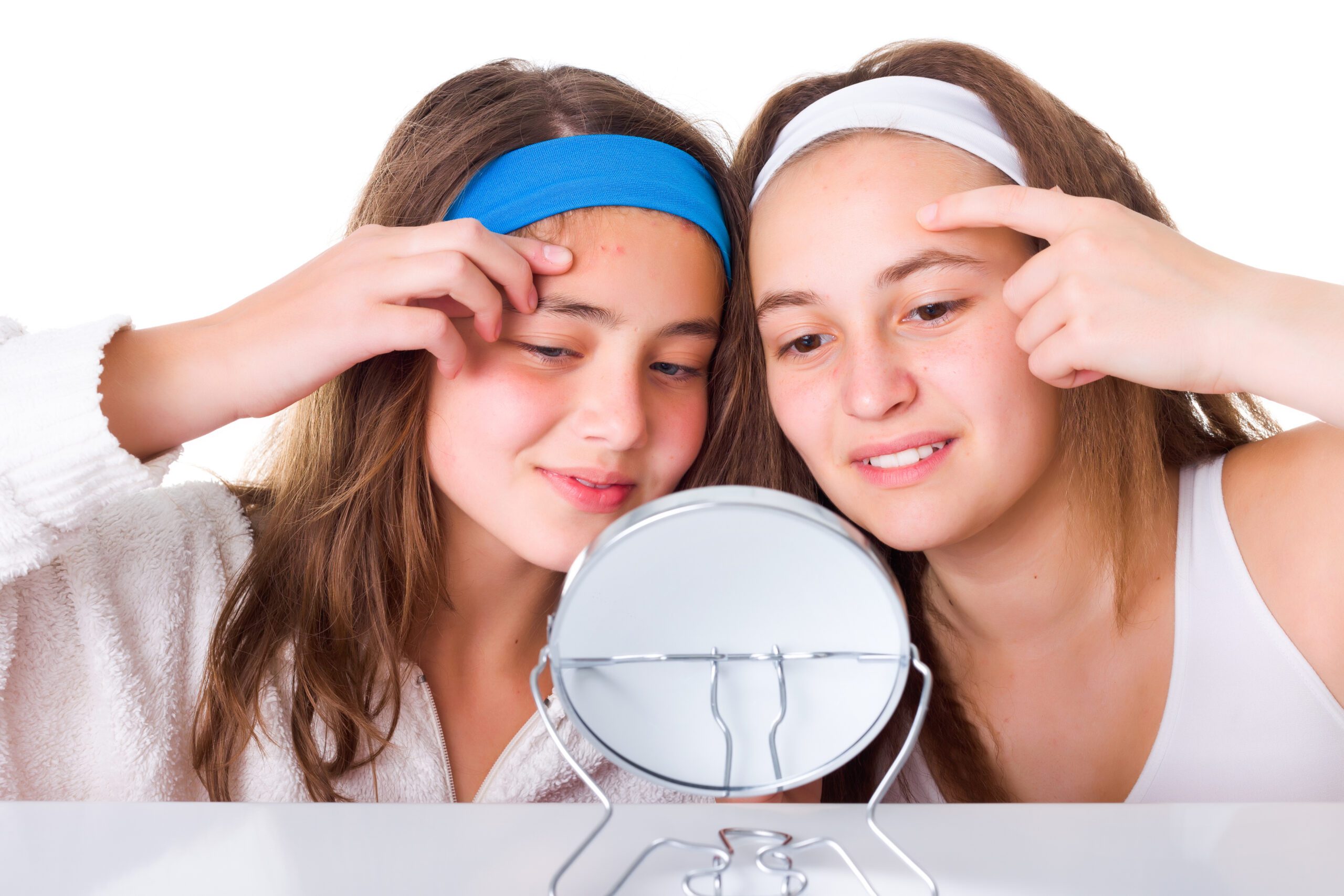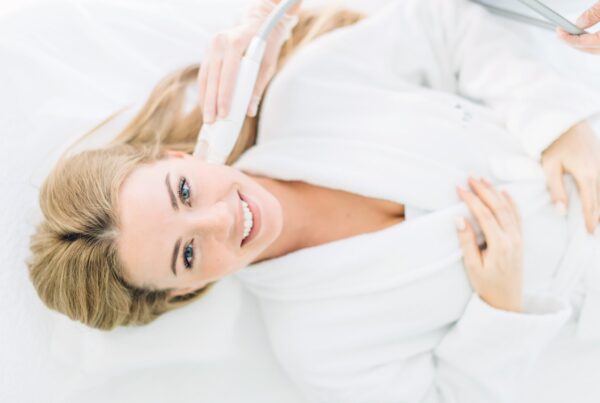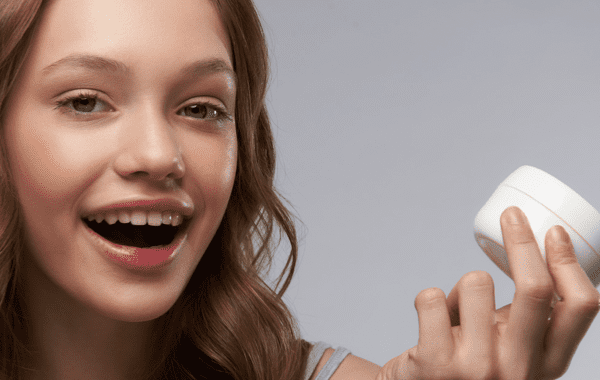If you don’t feel like reading, don’t worry! You can watch it instead as a video!
Acne is an extremely common condition that mostly affects adolescents; starting at age of 12 or even earlier, stats show that 85% of teenagers experience acne during this period bringing both physical and psychological effects. Despite genetics being responsible for this in a big proportion, in this blog post I will show you what influences acne and how the self-care habits developed since tween age can dramatically improve their skin health, and therefore, their self-esteem.
Why are tweens and teens affected by acne?
Acne is an inflammation of pores derived from excess oil and fungal or bacterial infection. To understand why the young skin is more affected by acne, let’s understand first how it is formed.
The process of teenage acne formation
- It all starts with a degradation of the skin barrier function. Balanced skin maintains an optimal cell renewal process also known as desquamation.
- When the barrier’s function is degraded, poor desquamation leads to an accumulation of dead cells on the skin surface.
- Because of hormonal changes derived from puberty, sebum production increases.

- When the excess sebum joins with dead cells that were not shed properly during desquamation, comedones are formed as a result of clogged pores.
- Comedones are the first stage of acne and future breakouts can be avoided with the right skincare routine at this point to restore the skin barrier function
- If the comedones formation persists, the balance of protective microorganisms in the skin is disrupted and bacteria come in.
- Once comedones are affected by bacteria, inflammation occurs as a result of infection, and at this point, we can call it bacterial acne which is the most common acne in the teenage population.
If you want to know more about all the details of acne and prevention tips don’t forget to visit our previous blog about this or download our free ebook «My First Pimple«.
Free E-book: My First Pimple
A parent's guide about the skincare of
Teens and Tweens
The importance of teenage skincare
If we take a deep look at the process of acne formation described above, we can identify some key takeaways that could help us to prevent it through the skincare routine:
- The stronger the barrier function works the less dead skin cells accumulation will occur.
- Despite excess oil production being more related to the hormonal change, excess shine that leads to clogged pores can be improved
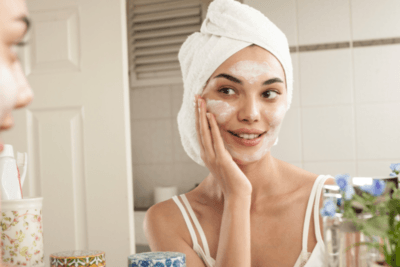
- Having a balanced skin microbiome is crucial for preventing acne
So, when we talk about the right habits to be established for acne-free skin, we should focus on the skin barrier, the skin microbiome, and natural oils.
At what age should a kid start a skincare routine?
The skincare routine should be established as soon as the first signs of skin imbalance start to show. This can happen around the age of 12 or even earlier.
Some parents decide to wait until their kids develop acne to start a skincare routine, but in my opinion, this is not the best idea as is much easier to prevent clogging pores than to unclog pores that are already infected.
The 3 categories of habits for skin health
If we have to put the 7 habits for skin health in categories, we could say that they are:
Topical habits
These are related to the skincare products we help them choose. Read below and I will tell you how to choose the proper natural skincare routine for them because adult skin products will not necessarily fit their needs.
Eating habits
You are what you eat and this is especially true for skin health. some foods can help to reduce inflammation and others can make it worse.
Emotional habits
Yes, our immunological response to health aggressors including skin health, is related to our emotional state.
Now let’s see some details for each category!
Category 1: topical habits
Habits in this category aim to counteract the disruption in the skin generated by hormonal changes. Preferably, these habits should be preventive, since once the skin si experiencing acne breakouts with severe infection, it requires different measures. The topical habits are:
- Cleanse
- Exfoliate
- Hydrate
- Protect
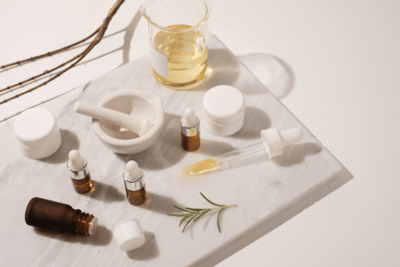
Habit 1: Cleanse
The main myth I notice when I’m asked for advice for choosing a cleanser for teen skin is that parents want a facial cleanser that completely takes away the natural oils from the skin surface. That is not possible if you want your kid to have healthy skin.
Sebum is a natural antiseptic for skin and despite some skincare brands using alcohol or harsh soaps on their products to remove it, it will only cause an imbalance in the natural protective microbial system of the skin also called the skin microbiome.

My key recommendations for establishing the right cleansing habit for teenage skin include:
- The gentlest way to remove the sebum excess and avoid clogging pores without affecting the skin balance is through the two steps cleansing process (Learn more about this in my previous blog)
- The product pH is important. Soaps bars or face washes containing soap (look for potassium hydroxide on the label) are too alkaline creating a conducive environment for bacterial proliferation
- The type of skin matters. Ingredients for oily skin or combination skin can differ from ingredients for sensitive skin. The same ingredients used in oily or acne-prone skin could lead to irritated skin if the teenager has sensitive skin.
- A gentle cleanser should not leave skin tied. That is a sign of dehydration
- I prefer a foaming cleanser above a gel cleanser because it needs less surfactant charge, however, both are good options if the pH is skin balanced (5.5 to 6).
Habit 2: Exfoliate
Exfoliation supports the removal of unwanted dead skin cells. However, for teen skin, mechanical exfoliation should be taken carefully and chemical exfoliation should be done through products with the right concentration.
In this previous article, I tell you everything you need to know about exfoliation however my key tips would be:

- Remove dead skin cells is a must, however, abusing of it could remove the sebum that needs to stay on the skin to protect it.
- For teen skin, I prefer BHAs (salicylic acid) above AHA (glycolic acid). The first one has a more preventive approach while glycolic is more used when post-acne scars have appeared.
- An adult product containing salicylic acid could have a 2% of concentration which I find too strong for the delicate skin of a teenager. I would prefer a 1% concentration for this amazing exfoliator.
Habit 3: Hydrate
Dehydrated skin affects the well functioning of the skin. Skin dehydration can occur because it lacks water or because water is evaporating in the absence of sebum or natural oils.
In this blog, I tell you everything on how to choose the right moisturizer for young skin.
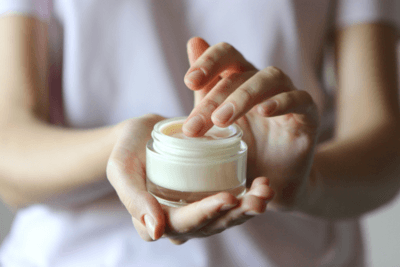
Is serum good for teenage skin?
Absolutely yes. Serums are one of my favorite products to use in skin care for teenagers.
Habit 4: Protect
Ultraviolet radiation is one of the worst skin aggressors as it causes skin cell abnormalities which reduces skin functioning and decreases collagen generation. Using sunscreen and topical antioxidants is a must from an early age.

Which is the best sunscreen for acne-prone skin?
Sunscreens are usually very greasy, which can cause pore-clogging, especially for teen acne-prone skin. That’s why I love this sunscreen because it provides good protection while is absorbed immediately.
FrezyDerm Sun Screen ``Velvet`` Second Skin Technology
Take a Look!
Is vitamin C serum good for teenage skin?
Absolutely yes. Vitamin C brightens, strengthens collagen, avoids acne breakouts, and increases oxidative activity that boosts SPF. I recommend some natural ones here.
Category 2: Eating Habits
In a previous article, we talked about how important is what we eat for our skin health. You can go there for more details however, skin care habits of teenagers should include choosing the right food. Below are those features of your skin that can be activated by food:
- Avoid the effect of free radicals
- Improve collagen production
- Synthesize vitamins
- Maintain blood flow
- Sebum regulation
- Keep low insulin levels
- Avoid worsening of skin conditions including acne
All these aspects are important for keeping our teenager skin health.
Habit 5: Supplement
Our body doesn’t synthesize vitamins or minerals, and these are essential not just for overall health but for our skin health.
Even though tweens or teens are eating a balanced diet, their vitamin and mineral levels in the body could not be in the best shape. That is why, supplementation could be a good idea at this age, especially for those kids who are already experiencing some skin conditions and vitamins could be part of the acne treatment.
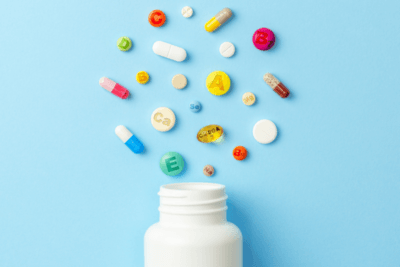
Take a look at a previous article about vitamins for the skin.
Category 3: Emotional Habits
Habit 6: Sleep
We should not forget that skincare is not only about what we put on our skin but also about how we treat our bodies in general. This includes exercise, sleep, and stress management among other things.
According to certain studies, sleep disturbance in early adolescence is associated with greater depression scores, which in turn is related to skin prone to irritation or acne. That is why mind and body medicine has been brought to dermatology and is being used as part of acne treatments as well as treating other skin conditions such as psoriasis or atopic dermatitis.
Habit 7: Meditate
When it comes to teen skincare, we probably think that stress management is not necessarily related, however, studies have shown that there is a direct interaction between the central nervous system and the immune system and therefore this last can be influenced by thoughts and other functions of the brain.
These studies go further and conclude that most of the common dermatologic problems such as teenage acne, rosacea, eczema, psoriasis, and other skin inflammatory disorders might be directly influenced by the kid’s thoughts and emotions.
That is why the use of meditation is growingly used for the healing of skin disorders.
In conclusion, it’s never too early to start developing healthy skin habits. Tweens and adolescents are especially vulnerable to the physical and psychological effects of acne, but by starting early and making simple changes in their routine, they can dramatically improve their skin health – and self-esteem. We hope you have enjoyed this article, and if you feel like it, I hope you can share it with other parents so that they can help set their children up for a lifetime of clear, beautiful skin!
Subscribe to Our Blog!
About Me

Beatriz Morales
If you don’t feel like reading, don’t worry! You can watch it instead as a video!
Acne is an extremely common condition that mostly affects adolescents; starting at age of 12 or even earlier, stats show that 85% of teenagers experience acne during this period bringing both physical and psychological effects. Despite genetics being responsible for this in a big proportion, in this blog post I will show you what influences acne and how the self-care habits developed since tween age can dramatically improve their skin health, and therefore, their self-esteem.
Why are tweens and teens affected by acne?
Acne is an inflammation of pores derived from excess oil and fungal or bacterial infection. To understand why the young skin is more affected by acne, let’s understand first how it is formed.
The process of teenage acne formation
- It all starts with a degradation of the skin barrier function. Balanced skin maintains an optimal cell renewal process also known as desquamation.
- When the barrier’s function is degraded, poor desquamation leads to an accumulation of dead cells on the skin surface.
- Because of hormonal changes derived from puberty, sebum production increases.

- When the excess sebum joins with dead cells that were not shed properly during desquamation, comedones are formed as a result of clogged pores.
- Comedones are the first stage of acne and future breakouts can be avoided with the right skincare routine at this point to restore the skin barrier function
- If the comedones formation persists, the balance of protective microorganisms in the skin is disrupted and bacteria come in.
- Once comedones are affected by bacteria, inflammation occurs as a result of infection, and at this point, we can call it bacterial acne which is the most common acne in the teenage population.
If you want to know more about all the details of acne and prevention tips don’t forget to visit our previous blog about this or download our free ebook «My First Pimple«.
Free E-book: My First Pimple
A parent's guide about the skincare of
Teens and Tweens
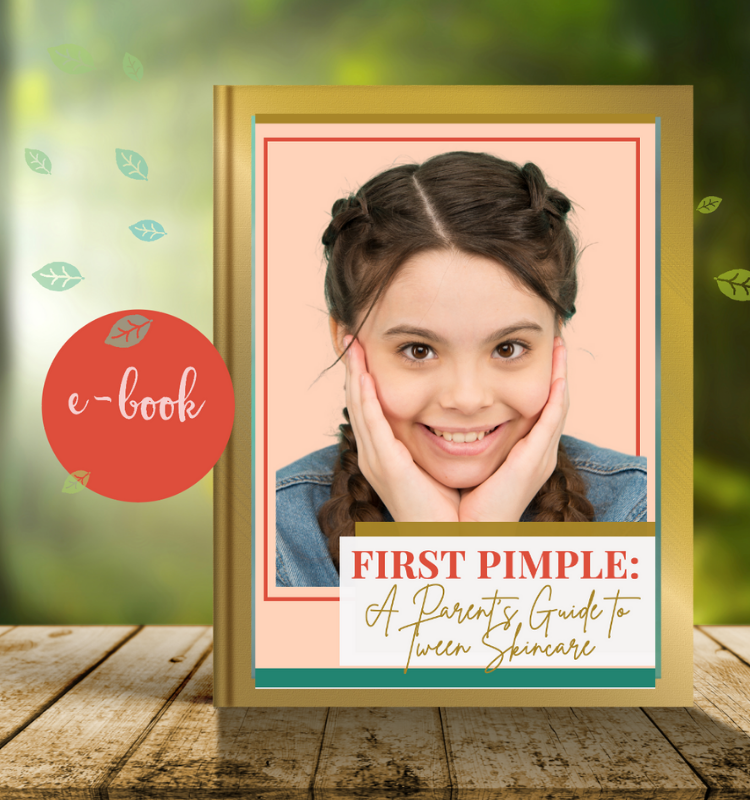
The importance of teenage skincare
If we take a deep look at the process of acne formation described above, we can identify some key takeaways that could help us to prevent it through the skincare routine:
- The stronger the barrier function works the less dead skin cells accumulation will occur.
- Despite excess oil production being more related to the hormonal change, excess shine that leads to clogged pores can be improved

- Having a balanced skin microbiome is crucial for preventing acne
So, when we talk about the right habits to be established for acne-free skin, we should focus on the skin barrier, the skin microbiome, and natural oils.
At what age should a kid start a skincare routine?
The skincare routine should be established as soon as the first signs of skin imbalance start to show. This can happen around the age of 12 or even earlier.
Some parents decide to wait until their kids develop acne to start a skincare routine, but in my opinion, this is not the best idea as is much easier to prevent clogging pores than to unclog pores that are already infected.
The 3 categories of habits for skin health
If we have to put the 7 habits for skin health in categories, we could say that they are:
Topical habits
These are related to the skincare products we help them choose. Read below and I will tell you how to choose the proper natural skincare routine for them because adult skin products will not necessarily fit their needs.
Eating habits
You are what you eat and this is especially true for skin health. some foods can help to reduce inflammation and others can make it worse.
Emotional habits
Yes, our immunological response to health aggressors including skin health, is related to our emotional state.
Now let’s see some details for each category!
Category 1: topical habits
Habits in this category aim to counteract the disruption in the skin generated by hormonal changes. Preferably, these habits should be preventive, since once the skin si experiencing acne breakouts with severe infection, it requires different measures. The topical habits are:
- Cleanse
- Exfoliate
- Hydrate
- Protect

Habit 1: Cleanse
The main myth I notice when I’m asked for advice for choosing a cleanser for teen skin is that parents want a facial cleanser that completely takes away the natural oils from the skin surface. That is not possible if you want your kid to have healthy skin.
Sebum is a natural antiseptic for skin and despite some skincare brands using alcohol or harsh soaps on their products to remove it, it will only cause an imbalance in the natural protective microbial system of the skin also called the skin microbiome.

My key recommendations for establishing the right cleansing habit for teenage skin include:
- The gentlest way to remove the sebum excess and avoid clogging pores without affecting the skin balance is through the two steps cleansing process (Learn more about this in my previous blog)
- The product pH is important. Soaps bars or face washes containing soap (look for potassium hydroxide on the label) are too alkaline creating a conducive environment for bacterial proliferation
- The type of skin matters. Ingredients for oily skin or combination skin can differ from ingredients for sensitive skin. The same ingredients used in oily or acne-prone skin could lead to irritated skin if the teenager has sensitive skin.
- A gentle cleanser should not leave skin tied. That is a sign of dehydration
- I prefer a foaming cleanser above a gel cleanser because it needs less surfactant charge, however, both are good options if the pH is skin balanced (5.5 to 6).
Habit 2: Exfoliate
Exfoliation supports the removal of unwanted dead skin cells. However, for teen skin, mechanical exfoliation should be taken carefully and chemical exfoliation should be done through products with the right concentration.
In this previous article, I tell you everything you need to know about exfoliation however my key tips would be:

- Remove dead skin cells is a must, however, abusing of it could remove the sebum that needs to stay on the skin to protect it.
- For teen skin, I prefer BHAs (salicylic acid) above AHA (glycolic acid). The first one has a more preventive approach while glycolic is more used when post-acne scars have appeared.
- An adult product containing salicylic acid could have a 2% of concentration which I find too strong for the delicate skin of a teenager. I would prefer a 1% concentration for this amazing exfoliator.
Habit 3: Hydrate
Dehydrated skin affects the well functioning of the skin. Skin dehydration can occur because it lacks water or because water is evaporating in the absence of sebum or natural oils.
In this blog, I tell you everything on how to choose the right moisturizer for young skin.

Is serum good for teenage skin?
Absolutely yes. Serums are one of my favorite products to use in skin care for teenagers.
Habit 4: Protect
Ultraviolet radiation is one of the worst skin aggressors as it causes skin cell abnormalities which reduces skin functioning and decreases collagen generation. Using sunscreen and topical antioxidants is a must from an early age.

Which is the best sunscreen for acne-prone skin?
Sunscreens are usually very greasy, which can cause pore-clogging, especially for teen acne-prone skin. That’s why I love this sunscreen because it provides good protection while is absorbed immediately.
FrezyDerm Sun Screen ``Velvet`` Second Skin Technology
Take a Look!
Is vitamin C serum good for teenage skin?
Absolutely yes. Vitamin C brightens, strengthens collagen, avoids acne breakouts, and increases oxidative activity that boosts SPF. I recommend some natural ones here.
Category 2: Eating Habits
In a previous article, we talked about how important is what we eat for our skin health. You can go there for more details however, skin care habits of teenagers should include choosing the right food. Below are those features of your skin that can be activated by food:
- Avoid the effect of free radicals
- Improve collagen production
- Synthesize vitamins
- Maintain blood flow
- Sebum regulation
- Keep low insulin levels
- Avoid worsening of skin conditions including acne
All these aspects are important for keeping our teenager skin health.
Habit 5: Supplement
Our body doesn’t synthesize vitamins or minerals, and these are essential not just for overall health but for our skin health.
Even though tweens or teens are eating a balanced diet, their vitamin and mineral levels in the body could not be in the best shape. That is why, supplementation could be a good idea at this age, especially for those kids who are already experiencing some skin conditions and vitamins could be part of the acne treatment.

Take a look at a previous article about vitamins for the skin.
Category 3: Emotional Habits
Habit 6: Sleep
We should not forget that skincare is not only about what we put on our skin but also about how we treat our bodies in general. This includes exercise, sleep, and stress management among other things.
According to certain studies, sleep disturbance in early adolescence is associated with greater depression scores, which in turn is related to skin prone to irritation or acne. That is why mind and body medicine has been brought to dermatology and is being used as part of acne treatments as well as treating other skin conditions such as psoriasis or atopic dermatitis.
Habit 7: Meditate
When it comes to teen skincare, we probably think that stress management is not necessarily related, however, studies have shown that there is a direct interaction between the central nervous system and the immune system and therefore this last can be influenced by thoughts and other functions of the brain.
These studies go further and conclude that most of the common dermatologic problems such as teenage acne, rosacea, eczema, psoriasis, and other skin inflammatory disorders might be directly influenced by the kid’s thoughts and emotions.
That is why the use of meditation is growingly used for the healing of skin disorders.
In conclusion, it’s never too early to start developing healthy skin habits. Tweens and adolescents are especially vulnerable to the physical and psychological effects of acne, but by starting early and making simple changes in their routine, they can dramatically improve their skin health – and self-esteem. We hope you have enjoyed this article, and if you feel like it, I hope you can share it with other parents so that they can help set their children up for a lifetime of clear, beautiful skin!
Subscribe to Our Blog!
About Me




